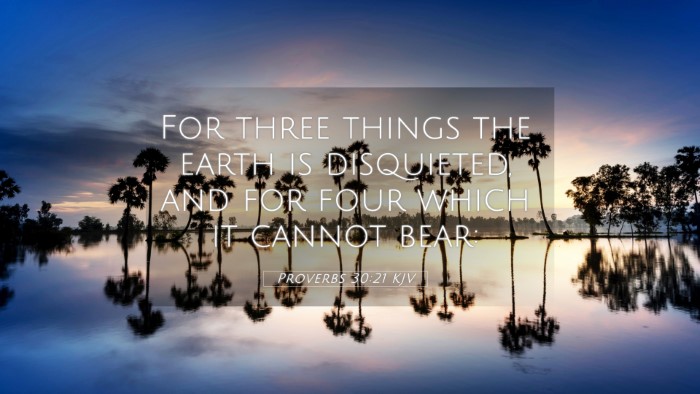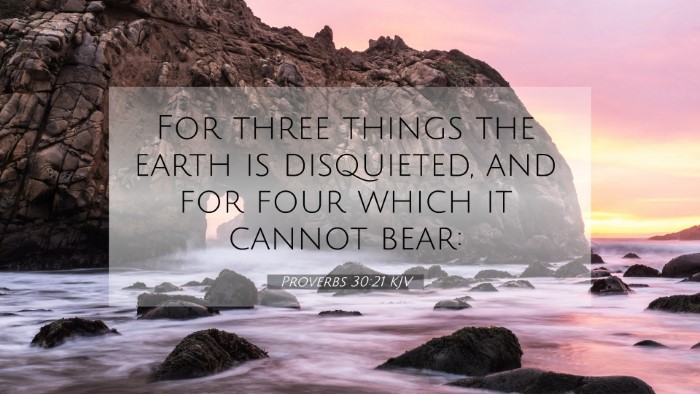Understanding Proverbs 30:21
Proverbs 30:21 states, "For three things the earth is disquieted, and for four which it cannot bear." This verse introduces a list of things that provoke instability and unrest in the world. It provides a thought-provoking insight into the nature of creation and human experience.
Insights from Public Domain Commentaries
According to Matthew Henry, this verse reveals the serious nature of certain societal issues. The phrase "disquieted" emphasizes an intense state of disturbance, suggesting that such conditions are intolerable from God's perspective. Henry notes that the careful observation of human behavior would recognize the destructive consequences resulting from these causes.
Albert Barnes elaborates by suggesting that Solomon, the author of Proverbs, intends to express the gravity of the earth's instability due to unworthy social conditions. These issues are critical not only to the society of the time but resonate through generations as we encounter moral and ethical dilemmas in contemporary life.
Adam Clarke provides an additional layer of understanding by suggesting that the verse serves as a highlight to the reader about the burdens that result from unbridled ambition, arrogance, and moral failures. These evoke a sense of chaos and financial distress, not just on an individual level, but extend to the societal fabric.
Key Themes in Proverbs 30:21
- Causes of Earthly Distress: This verse categorically identifies certain behaviors—ambiguously abstract—that have real consequences.
- Societal Responsibilities: There is an underlying call for holding individuals accountable for their actions within society.
- Moral Reflection: The comparison between disquiet within society and how it reflects on the individual choice of morality.
- Divine Perspective: There is emphasis on how God views human behavior and its effects on creation.
Cross-References and Thematic Connections
Proverbs 30:21 can be cross-referenced with several other Bible verses that share thematic elements. Here are some important connections:
- Proverbs 11:1: "A false balance is abomination to the Lord: but a just weight is his delight." - Reflecting on fairness in society.
- Jeremiah 5:9: "Shall I not visit for these things? saith the Lord: and shall not my soul be avenged on such a nation as this?" - God's displeasure at societal corruption.
- Ecclesiastes 4:1: "So I returned, and considered all the oppressions that are done under the sun...". - Observations on injustice causing distress.
- Galatians 6:7: "Be not deceived; God is not mocked: for whatsoever a man soweth, that shall he also reap." - The consequences of one's actions.
- Isaiah 24:5: "The earth also is defiled under the inhabitants thereof; because they have transgressed the laws, changed the ordinance, broken the everlasting covenant." - A testimony to the fragility of creation due to human actions.
- Matthew 24:7: "For nation shall rise against nation, and kingdom against kingdom: and there shall be famines, and pestilences, and earthquakes, in divers places." - Prophetic insights into unrest.
- James 3:16: "For where envy and strife is, there is confusion and every evil work." - The correlation of emotional turmoil with societal issues.
Practical Applications
Understanding Proverbs 30:21 helps us to reflect on the themes of accountability and social harmony in our lives. Through careful study, we can identify personal behaviors and societal norms that lead to unrest and work towards solutions that align with biblical principles.
Tools and Resources for Bible Cross-Referencing
For deeper study, consider the following tools and resources:
- Bible concordance for finding relevant verses
- Bible cross-reference guide to explore themes systematically
- Cross-reference Bible study methods to enhance understanding
- Bible reference resources for checks on varied interpretations
- Comprehensive Bible cross-reference materials available in print and digital form
Conclusion
In summary, Proverbs 30:21 offers profound insights into the causes of societal unrest and emphasizes the need for personal and collective responsibility within humanity. Each cross-referenced verse enhances our understanding of the themes presented, creating a dialogue that reaches across the Biblical text.


